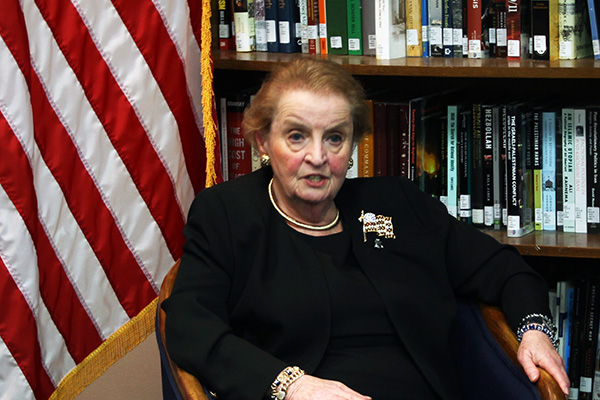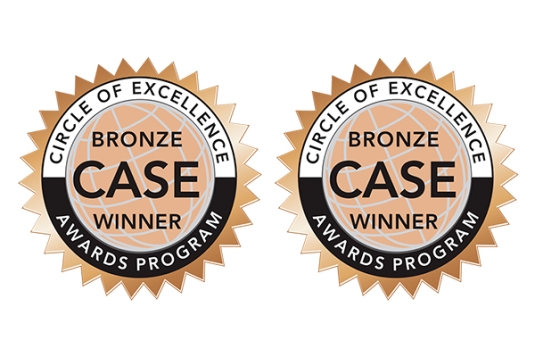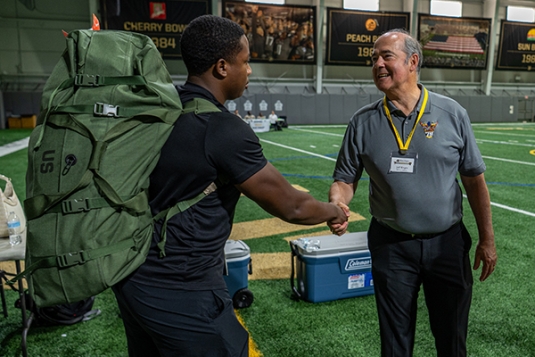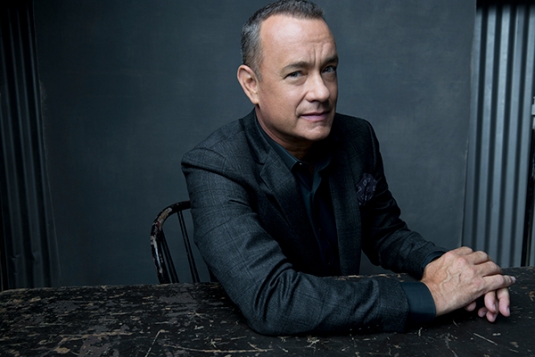Annually, since 1958, the Thayer Award has recognized a lifetime of service of a great American. This year’s recipient, the Honorable Madeleine K. Albright, wanted to recognize the great American service men and women she has encountered over her lifetime.
Early in her acceptance speech before the Corps of Cadets, Dr. Albright acknowledged the remarkable list of Thayer Award recipients to which she now belongs and said the one with whom she most wanted to share the stage was the 2002 winner—The American Soldier. From her time as young refugee in England during World War II watching “the Yanks” come to Europe’s aid, to her time as the 64th Secretary of State visiting soldiers stationed overseas, Dr. Albright said that she has always been impressed by their enthusiasm and commitment and, “as one citizen,” acknowledged an “enormous debt to those who have chosen to contribute their energy and talents to the armed forces of our country.”
Like those before her, Dr. Albright had the opportunity to review the Corps of Cadets assembled in formation on the Plain to honor the Thayer Award recipient. “After seeing your amazing parade,” she told the Corps at dinner, “I feel like saying to those back in our Capitol—these men and women deserve better.” Her adlibbed line brought roaring applause from the cadets in the Mess Hall.
Trooping the line with the Superintendent was not Dr. Albright’s only interaction with cadets. Earlier in the day, she had Q&A sessions with cadets from the Department of Behavioral Sciences and Leadership’s Black and Gold Leadership Forum, with cadets associated with the Center for the Study of Civil-Military Operations (CSCMO), and with Truman Scholar cadets (Dr. Albright is President of the Harry S. Truman Scholarship Foundation). Regarding this last session, Cadet Ahmad Nasir ’14 had the opportunity to ask Dr. Albright what her response to Syria would have been if she were still the Secretary of State. “The answer she gave was in-depth and thoughtful,” Nasir said. “She included just about everything, from the broad geopolitical implications of the situation to the minute details surrounding it.”
“I have enjoyed my interaction with the cadets and with the faculty here very much,” Dr. Albright said. Addressing CSCMO specifically, she noted, “I think CSCMO is an example that this great military academy is not just sitting on its laurels; it’s a tribute to the Academy that its leadership is constantly looking forward to how we educate the next generation of America’s leaders on dealing with these important issues.”
The West Point Association of Graduates presents the Thayer Award annually to a U.S. citizen, other than a West Point graduate, whose outstanding character, accomplishments, and stature in the civilian community draw wholesome comparison to the qualities for which West Point strives, in keeping with its motto: Duty, Honor, Country. Here’s a list of Dr. Albright’s signature accomplishments, which earned her a place alongside the previous 55 Thayer Award recipients:
• Appointed Research Professor of International Affairs at Georgetown University’s School of Foreign Service and Director of its Women in Foreign Service Program.
• Awarded a fellowship at the Woodrow Wilson International Center for Scholars at the Smithsonian.
• Nominated to be the U.S. Permanent Representative to the United Nations, where she was a leader in ending ethnic cleansing in Kosovo.
• Became the 64th U.S. Secretary of State, confirmed by a Senate vote of 99-0 making her the first female Secretary of State and the highest-ranking woman in the history of the U.S. government.
• Promoted the expansion of NATO eastward into the former Soviet bloc nations and the non-proliferation of nuclear weapons from the former Soviet republics to rogue nations.
• Elected a Fellow of the American Academy of Arts and Sciences.
• Authored five books, including Memo to the President Elect: How We Can Restore America’s Reputation and Leadership (2008).
• Remains a strong proponent of building a multi-faceted relationship with China to include trade agreements and fostering human rights.
• Responsible for developing and implementing programs designed to enhance women’s professional opportunities in international affairs.
• Holds a bachelor’s degree from Wellesley College (political science) and a master’s and doctorate from Columbia University’s Department of Public Law and Government.
Dr. Albright is the 4th woman to receive the Thayer Award (the Honorable Clare Booth Luce in 1979, Barbara Jordan in 1995, and Justice Sandra Day O’Connor in 2005) and the 3rd recipient of the award not to be born in the United States (Bob Hope in 1968 and Henry A. Kissinger in 2000).
Speech
Madeleine Albright’s Acceptance Speech of
The 2013 Sylvanus Thayer Award
West Point, New York
Thursday, October 17, 2013
Thank you so much, Col. McClure and the Association of Graduates, and Gen. Caslen. Good evening to you all. I am delighted to be back at West Point, grateful for your warm welcome, and deeply honored to receive the Thayer award. The list of previous recipients is an extraordinary one that includes many people who once held high office or otherwise achieved fame. But looking down the list, I know that if I had to choose a single companion to watch my back, it would be the winner of this award in 2002—the American soldier.
I say that, in part, because of where I was born—and when. Like many Americans, I did not begin life in the United States. Instead, I entered the world in Czechoslovakia only a few months before Hitler’s troops marched into that country’s capital city of Prague. My father was a diplomat at the time and subject to arrest by the Nazis. So my parents and I fled to England, which is where we spent World War II. Among my first memories are those of sitting with our neighbors during air raids, huddled together in a shelter while enemy bombers flew overhead, waiting for the “all clear” to sound. Our anxieties were heightened because the war in Europe had not begun well and it seemed that we—who had found refuge in Great Britain—might be left to fight alone. But then, one day, wonderful news came from across the sea. A brave army had answered the call and was on its way to rescue freedom. Soon, the Yank soldiers arrived, bringing with them their boundless energy, confident wisecracks, and jaunty way of walking. On the streets of British cities and towns, the children trailed along behind, shouting “Hey Joe” and asking in a plaintive voice: “Got any gum, chum?” Then, in early June, the troops were suddenly nowhere to be seen; Operation Overlord, the largest amphibian landing in history, had been launched. In the months that followed, almost an entire continent lost to evil had to be taken back village by village, hill by hill. It was an assault carried out against dug-in positions, amid rain and mud and blood and darkness, winnable only through unbelievable courage and at unbearable loss. In those days, the entire spectrum of human possibility was on display, from the soulless horror of Buchenwald and Auschwitz to the selfless bravery of allied warriors. My father was head of broadcasting for the Czechoslovak government-in-exile; and as the fighting progressed, he reported each breakthrough to the millions of people back home—secretly listening in cellars and attics. Meanwhile I celebrated—and for the first but not last time—fell in love with Americans in uniform.
I was just eight years old when the war ended and we returned to Prague. Because the fighting was over, my parents and I did our best to settle in and resume a normal life. But within a couple of years, the government of Czechoslovakia was taken over by Communists. Once again, my family was forced into exile, this time sailing across the ocean to a new and welcoming home. I will always be grateful for the warm reception we received and for the opportunity I had to grow up in a country that cherished freedom. For as long as she lived, my mother used to call me on the Fourth of July and want to know whether her grandchildren were singing patriotic songs. As for my father, he used to cite a contrast. He said that, in Europe, people would say to refugees, “We are sorry for your troubles and hope that you have everything you need; by the way, when will you be leaving to go back home?” But in America, people said to refugees: “We are sorry for your troubles and hope that you have everything you need; by the way, when will you become a citizen?”
You cannot imagine how privileged I felt when, as secretary of state, I flew to important meetings on a plane bearing the proud title: United States of America. While in office, I seized every opportunity I had to visit with our soldiers, sailors, and aviators who were stationed overseas. Like the cadets at this academy, these were men and women from across our land, representing every variety of background, race, color, and creed. I was impressed by their enthusiasm and commitment, whether their assignments were in Europe, the Balkans, the Arabian Peninsula, or East Asia. When sitting with these soldiers, I never heard a single complaint—well, perhaps that’s not quite true. After all, just because someone is in the Army doesn’t mean they’re too shy to speak up. And yet the most frequent concern those young people shared had nothing to do with personal comfort; it was the fear that folks back home didn’t really understand how important their mission was—or how much good they were doing on behalf of the United States. I was deeply troubled by this—and saw in it a reflection of the era in which we live.
As I’m sure most of you know, back in 1962, the Thayer award recipient delivered one of the most moving speeches in American history. To General Douglas MacArthur, the motto “Duty, Honor, Country,” conjured up transcendent images of battlefield valor; images that were fresh in the minds not only of his immediate audience, but of Americans everywhere and of freedom-loving people across the globe. But since MacArthur spoke, more than five decades have elapsed. In that time, the two world wars and Korea have receded in memory, as first Vietnam, then the Persian Gulf, then Afghanistan, then Iraq again, then Afghanistan again, moved to the fore. Meanwhile the technology of warfare has changed, and so have the tactics; the enemy now strives to remain invisible and the means that it uses are unconventional. MacArthur spoke of the Army in heroic terms, but these do not always feel like heroic times. Our recent military engagements have played out against a complicated political backdrop, tinged with religious and cultural tension, questioning allies, less than conclusive results, and an American public that often seems disengaged. Every few weeks, our newspapers do a service by publishing pictures of the fallen, reminding us that each day our fighting men and women—many on their third or fourth or fifth deployments—are still being wounded, maimed and killed. As one citizen, I acknowledge an enormous debt from me to you and to all who have chosen to contribute their energy and talents to the armed forces of our country. That debt extends, and especially so, to our veterans, many bearing permanent scars of battle, and meriting a permanent place of honor in our collective memory and in our hearts.
And yet as I stand here, in the fall of 2013, I ask myself how well that debt is being re-paid. It seems to me that, if we are to protect the security and prosperity of our country, we should put an end to partisan squabbling, do a little arithmetic, and develop a unified and lasting approach to the federal budget. I came up today from Washington, and after reviewing your amazing parade, I feel like saying when I get back, to those in our Capitol—these young men and women deserve better. In the process, we should invest first of all in the education of our young people so that they will be able, when of age, to meet the demands that modern military service and the global marketplace require. We must also ensure that our fighting men and women have leadership, training, and equipment second to none; and that our military families are treated with the respect they deserve—before, during, and after the fighting is done.
Finally, we have to resist the suggestion heard more and more often that we Americans need not bother about problems overseas—and that if we just mind our own business, nothing like Pearl Harbor or 9/11 will ever happen again. Here at West Point, cadets are taught about engineering and mathematics, history and science, but above all, you learn about the qualities demanded of a leader. So I suspect that I do not have to tell you that American leadership is still needed in the world today. Past lessons inform us that we cannot allow our country to become tired; we can’t turn our backs on our responsibilities; we can’t pretend that we are not the United States.
America remains the only nation blessed with the power to lead and the ideals to do so in a direction that most of the world would prefer to go—towards fulfillment of that singular pledge: liberty and justice for all. It’s true that the siren song of isolation will always have appeal for us, as it has, in varied form, to all people. It would be comforting to believe that we can wall ourselves off from the ailments of the world; or that if we but refrain from giving offense, we will never be attacked—but these are illusions. We cannot build our security on wishes; the survival of freedom depends on our vigilance, readiness, and strength. Make no mistake, history did not end in the fabled woods of the Ardennes or on the beach at Iwo Jima; it did not end when the Berlin Wall crumbled, Saddam Hussein was toppled, or Osama bin Laden was killed.
Each generation is tested and each must choose; between appeasement and preparedness; complacency and victory. Today, we are embattled on many fronts. Al Qaeda and its affiliates have been weakened, but will remain a threat as long as receptive ears are found for their poison and the gullible can be persuaded that murderers are martyrs. In Afghanistan, our intervention is winding down, but dangers persist because, in an unconventional war in an untamed land, finding the right path out is often more perilous than plunging in. In Syria, a devastating civil war threatens to devour an entire region, forcing us to be involved but with no clear guideposts to the stable, peaceful and democratic country we would like to see. In southwest Asia, we are trying to determine whether or not Iran’s military has developed nuclear weapons; while in East Asia, North Korea already has. China and Russia are once again rising nations, each with its own ambitions and agenda; we have shared interests but also mutual suspicions and cannot be sure what the future will bring. Meanwhile, from Cairo and Kyiv to Caracas and Harare, the historic confrontation between democracy and autocracy has been renewed.
Upon graduating from this academy, you will enter into an era of permanent struggle, not simply between good and evil, but often involving forces that do not rightly understand the connection between what they do and what they seek; forces that are driven—as in the Middle East—by ancient rivalries, mutual fears, the lack of economic opportunity, the quest for personal identity, and the passionate but mindless search for revenge. In this environment, our armed forces will be called on to defend our country in ways that demand a versatile array of skills and a range of knowledge even more far-reaching than in the past. Because our enemies have long-term strategies, we have to make long-term commitments. Because our adversaries rely on a popular base, we must integrate our military initiatives with dependable alliances, effective diplomacy, the mastery of electronic communications, and civilian programs that work. Because unforeseen events can transform the globe overnight, we must be prepared for a variety of contingencies—including those involving the growing area of gray between peace and war. And because no clash is more pivotal than the battle of ideas, we must remain true to our own best traditions.
The truth is that every action entails risk, but so does every decision to refrain from acting. No one understands this better than the US Army—where overcoming hardships has always been a way of life. The world is constantly changing and the Army has changed with it. But what matters even more is what has not changed—the excellence of this academy, your sense of honor as future leaders, your confidence in yourselves and in each other and your love for the United States of America. The U.S. Army—past, present, and future—is without question The Strength of our Nation and—let me say again as one American—I am truly grateful.
In closing, I ask you always to remember that even before the United States was a country; it was an idea. We are the inheritors of a tradition that dates back not to the courtly intrigues of inbred royalty or to the greedy ambitions of empire, but to the architects of human liberty. We believe in the rights and responsibilities of the individual and in the power of each of us to make a difference. We place our faith in a democratic system backed by the energy, ingenuity and courage of a free people. And we find our inspiration in the heroes who have fought our nation’s battles—and kept our Army rolling along—from Valley Forge and Gettysburg to Omaha Beach and Kandahar. More than six decades have elapsed since I first came to these shores. But I have not forgotten the fundamental lesson taught to me by my parents. And that is to honor and value American ideals, and never take for granted the privilege of living in the world’s greatest democracy. To every member of the West Point family who is here tonight, let me say that for all you have done for our country in the past, I applaud you. For all you are now doing and will do in the future, I salute you. And for your warm welcome and kind attention here this evening, I thank you very much.
Biography
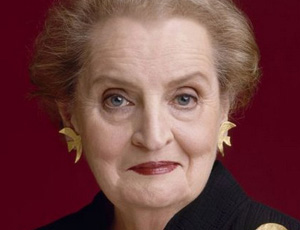
Madeleine Korbel Albright was nominated by President Clinton on December 5, 1996 as Secretary of State. After being unanimously confirmed by the U.S. Senate, she was sworn in as the 64th Secretary of State on January 23, 1997. Secretary Albright is the first female secretary of state and the highest ranking woman in the history of the U.S. government. Prior to her appointment, Secretary Albright served as the United States Permanent Representative to the United Nations (presenting her credentials at the UN on February 6, 1993) and as a member of President Clinton’s Cabinet and National Security Council.
Secretary Albright formerly was the President of the Center for National Policy. The Center is a non-profit research organization formed in 1981 by representatives from government, industry, labor and education. Its mandate is to promote the study and discussion of domestic and international issues.
As a Research Professor of International Affairs and Director of the Women in Foreign Service Program at Georgetown University’s School of Foreign Service, she taught undergraduate and graduate courses in international affairs, U.S. foreign policy, Russian foreign policy, and Central and Eastern European politics, and was responsible for developing and implementing programs designed to enhance women’s professional opportunities in international affairs.
From 1981 to 1982, Secretary Albright was awarded a fellowship at the Woodrow Wilson International Center for Scholars at the Smithsonian following an international competition in which she wrote about the role of the press in political changes in Poland during the early 1980s. She also served as a Senior Fellow in Soviet and Eastern European Affairs at the Center for Strategic and International Studies, conducting research in developments and trends in the Soviet Union and Eastern Europe.
From 1978-1981, Secretary Albright was a staff member on the National Security Council, as well as a White House staff member, where she was responsible for foreign policy legislation. From 1976-1978, she served as Chief Legislative Assistant to Senator Edmund S. Muskie.
In October 2008, Secretary Albright received the AUSA Marshall Award.
She was awarded a B.A. from Wellesley College with honors in Political Science, she studied at the School of Advanced International Studies at Johns Hopkins University, received a Certificate from the Russian Institute at Columbia University, and her Masters and Doctorate from Columbia University’s Department of Public Law and Government.
Selected writings include Poland, the Role of the Press in Political Change (New York: Praeger with the Center for Strategic and International Studies, Georgetown University, Washington D.C. 1983); The Role of the Press in Political Change: Czechoslovakia 1968 (Ph.D. Dissertation, Columbia University 1976); and The Soviet Diplomatic Service: Profile of an Elite (Master’s Thesis, Columbia University 1968).

